Carl E. Olson's Blog, page 265
November 11, 2011
Saint Martin of Tours and the Search for Holiness

Saint Martin and the Search for Holiness | Régine Pernoud | Prologue to Martin of Tours
November 11 is now a red-letter day on the French civil calendar: in 1918 that date marked the end of the slaughter that was the First World War. But even before France was called France, that date, the eleventh of November, had been a date on the calendar used throughout Christendom because it commemorated the burial at Tours of the amazing individual whom we call Saint Martin.
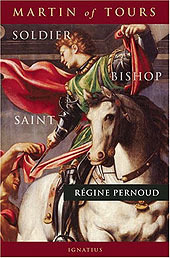 He was an amazing and even a paradoxical man: he never accomplished what he had hoped to do, and yet his accomplishments surpassed all possible expectations. To begin with, this man, who had always tried to go unnoticed, enjoyed extraordinary popularity. He wanted to be a hermit, to flee the world and devote himself to ascetical practices; instead he was constantly surrounded by people, during his lifetime and after his death: the pilgrimage shrine of Saint Martin in Tours was once the most important after the three great pilgrimage sites of Christianity, Jerusalem, Rome, and, later on, Saint James of Compostela. He is remembered as a soldier, and indeed he was one, albeit entirely against his will. He had refused to be ordained a priest, considering himself unworthy, and yet he became a bishop. He had fled the world and sought a life of seclusion, but instead his biography was written while he was still living!
He was an amazing and even a paradoxical man: he never accomplished what he had hoped to do, and yet his accomplishments surpassed all possible expectations. To begin with, this man, who had always tried to go unnoticed, enjoyed extraordinary popularity. He wanted to be a hermit, to flee the world and devote himself to ascetical practices; instead he was constantly surrounded by people, during his lifetime and after his death: the pilgrimage shrine of Saint Martin in Tours was once the most important after the three great pilgrimage sites of Christianity, Jerusalem, Rome, and, later on, Saint James of Compostela. He is remembered as a soldier, and indeed he was one, albeit entirely against his will. He had refused to be ordained a priest, considering himself unworthy, and yet he became a bishop. He had fled the world and sought a life of seclusion, but instead his biography was written while he was still living!
Thanks to those who discerned the extraordinary qualities in this rather reticent, unassuming man who resolutely practiced poverty, we know the story of his life. It spans the fourth century, in which the Church became free at last to live above ground, only to be torn by dissension so widespread that it almost brought her to ruin.
There are not many individuals whose biographies were written during the fourth century, especially during their lifetime. This was the case, however, with Martin of Tours, thanks to his friend Sulpicius Severus, who survived him long enough to record for us also the story of his death. And so we have the unusual good fortune of possessing a contemporary document to tell us about a man who, throughout his life, sought only to live among his peers, in obscurity.
In Search of Holiness
Sulpicius Severus was handsome, young, and rich. He lived in Bordeaux, a particularly prosperous town in the fourth century, where he received an outstanding education; he practiced law there and excelled in his profession because of his great eloquence. His family belonged to that Gallo-Roman aristocracy which enjoyed the favor of the Roman emperors because their power depended upon it. Thus, in the region that would later be called Aquitaine, there were several families that owned enormous estates and a large number of slaves and were extremely wealthy. The province was crossed by navigable waterways, which guaranteed abundant commerce. Bordeaux at that time had the reputation of being an "intellectual" city; like Toulouse, it had quite a number of citizens who had conformed completely to the customs and tastes characteristic of the Roman Empire. In the region surrounding Toulouse archeologists have found as many busts and sculptures from the imperial era as they have in the vicinity of Rome–artwork intended to ornament the villas where these opulent families lived.
Sulpicius Severus, being a lawyer, had made a name for himself in "upper-middle-class" circles while he was still a very young man. His reputation is inseparable from that of the man who would later be called Paulinus of Nola, with whom he was bound by ties of friendship. Paulinus, a lawyer like Sulpicius, came from an even richer family than his and was likewise an avid man of letters. It is easy to imagine the two friends going together to the thermal baths or attending the literary gatherings of the day, where people discussed the poetry of Virgil or Ovid, or perhaps the eloquence of Cicero. Paulinus, who was highly valued by Emperor Valentinian II, had been appointed for a time as governor of Campania, but he had resigned from his official duties and returned to Bordeaux so as to lead there a life of elegant leisure, as was the fashion then on the banks of the Garonne River.
Now a new factor came into his life around the year 389 (Paulinus was about thirty-six years old at the time): he was touched by the gospel. The Christian religion, which had been spreading freely for a good sixty years–the Edict of Milan promulgated by Constantine, which ended the persecutions, dated back to the year 313–would thoroughly transform that pleasure-seeking aristocrat. In the year 390, together with his wife, Therasia, he received baptism. His encounter with the Christian faith may have been fostered by the great sorrow he had experienced at the death of a beloved brother.
Soon afterward, Sulpicius in turn was touched by grace. He had been married only a little while, and perhaps his motherin-law, Bassula, who was a fervent Christian, had had some influence upon him. He received baptism, but his wife died shortly after, and he found himself disowned by his father, who could not abide his conversion. Moreover, Sulpicius himself was preparing to follow the example of his friend Paulinus, who had begun to divest himself of all his property, following the evangelical counsel of poverty to the letter. Of what he inherited from his wife, Sulpicius kept only a small lot, a kind of temporary lodging, where from then on he would welcome a number of other Christian converts who wished to lead a life of prayer and asceticism. The place was called Primullacum in Latin, and it has been identified with the little city of Alzonne on the road from Toulouse to Carcassonne, not far from Brain, in the Aude in Languedoc. Sulpicius must have taken up residence there in 394 or a little earlier.






It was there, too, that he received the letters that Paulinus wrote to him. For example, the one in which he expresses, in the rather emphatic language of that era, his admiration for his young friend:
But you, my most beloved brother, were converted to the Lord by a greater miracle [than I]. For you were closer to your prime, you were winning greater eulogies, the burden of your inheritance was lighter, yet you were no poorer in store of wealth; you were still prominent in the fame of the forum which is the theatre of the world, and you held the palm for glory of eloquence. Yet with a sudden urge you shook off the slavish yoke of sin, and broke the deadly bonds of flesh and blood. Neither the additional riches brought by your marriage into a consular household nor the easy tendency to sin after your marriage [i.e., after he was widowed] which followed your celibate youth could draw you back from the narrow entrance to salvation, from the steep path of virtue to the soft, broad road trodden by many. [1]
And Paulinus continues, recalling the friendship that united them in their youth:
What shall I render to the Lord for this grace in addition to all his bounty to me? (Ps 115 [116]:12). For through this grace He has joined you to me not only as a most beloved friend in our earlier life in the world, but also as an inseparable companion and partner in the spiritual brotherhood of His affairs.... [T]hat intimate friendship of our earlier life, when we still loved the things which we now reject in Christ, marked us out for each other in the love of Christ. [2]
Paulinus had returned with his wife to Campania, where he settled at Nola, a little town founded of old by Saint Felix, who was buried there. From then on Paulinus and his wife led a very austere life, dwelling in the same house but living as brother and sister, and devoting themselves to the needs of the pilgrims and the poor. Paulinus had already been ordained a priest in Barcelona, and in 409 he was appointed bishop of Nola. In another one of his letters to Sulpicius he writes: "You revealed the increase of your inheritance amongst the saints. This you did by your wholesome disposal of the burdens of this world, for you have purchased heaven and Christ at the price of brittle worldly goods," [3] Thus the correspondence between the two friends leaves no doubt as to their complete conversion, which led both of them to give away their fortunes. It is said that even Sulpicius, who retained his ownership of Primuliacum, only did so in order to host friends there, as well as his mother-in-law, with whom he maintained close ties of friendship and whose fervent faith was evident. He experienced scruples, however, on that account, and Paulinus reassured him:
And why should you lament that you on the contrary are still unhappily clinging to the slimy dregs of hell below, just because from your letter you appear not to have sold one petty estate? Your forfeiture of your present right even to that farm is equivalent to selling it, so that by the greater fruits of your faith you showed to God a twofold dedication ... for the goods you have kept back are possessed by the church which you serve. [4]
Sulpicius Severus, while in retirement on his estate, received many visitors, and that is how he heard about the bishop of Tours, Martin.
As for Paulinus, even before his conversion he had been in contact with Martin. Later on Sulpicius would tell of the circumstances. "A man named Paulinus, who was afterwards to be an example to all, had begun to suffer from acute pain in one eye and a fairly thick film had by now grown over the pupil. Martin, by touching the eye with a fine paintbrush, restored it to its former state and at the same time banished all the pain." [5] This probably took place during a journey that Martin made to Vienne, and it is conjectured that the two friends must have had an ongoing discussion about this cure.
But this was certainly not the only reason that prompted Sulpicius to go to see Martin. Plainly, the reputation of the bishop of Tours had aroused his curiosity even before that. " 11 had previously heard accounts of his faith, his life, and his powers and burned with the desire to know the man himself", he writes. "I therefore undertook as a labor of love a pilgrimage to see him." Indeed, in those days the journey from the regions along the Garonne River to the banks of the Loire River was long. Traveling from north to south was easy through the Saône and Rhône valleys, but that was not the case in the western territories that drain into the Atlantic Ocean; furthermore, the Roman roads crossed France from east to west.
"At the same time," Sulpicius relates, I was all on fire to write his life." His natural talents would find expression in a literary work that was perfectly suited to his deep feelings. He decided, therefore, to make the journey. "You would never credit the humility and kindness with which [Martin] received me on that occasion. He congratulated himself and praised the Lord because I had thought so highly of him that I had undertaken a long journey especially to see him." And he tells of his embarrassment when Martin invited him to share in a meal, and "it was he who fetched the water for me to wash my hands and, in the evening, it was he who washed my feet. Nor had I the courage to remonstrate or resist. I was so overcome by his authority that I would have felt it impious to do anything but acquiesce."
No doubt this visit made a profound impression on Sulplcius. He found in Martin just as saintly an individual as he had been said to be. "But all his talk while I was there was of the necessity of renouncing the allurements of the world and the burdens of secular life in order to follow the Lord Jesus freely and unimpeded." And the following lines suggest even more the extent to which the conversations with Martin must have affected his guest: indeed, Martin held up Paulinus to him as an example! "He quoted as an outstanding example in our own day the case of his Excellency Paulinus, whom I mentioned earlier. He had abandoned immense wealth to follow Christ and was almost alone in our times in fulfilling the evangelical counsels. 'There,' Martin kept exclaiming, 'there is someone for you to follow."' We can surmise that his words elicited an emotional response from his interlocutor! Martin drew from the decision of Paulinus a lesson for his generation: "For a rich man with great possessions, by selling all and giving to the poor, had illustrated Our Lord's saying, that what is impossible to do is in fact a possibility."
After that memorable encounter, Sulpicius was able to undertake what would be the great accomplishment of his life: writing the life of Martin of Tours. It took nothing less than the call of the gospel and the power of the faith to draw together two men who were so dissimilar, from such different social backgrounds.
Endnotes:
[1] Ancient Christian Writers Series, Letters of St. Paulinus of Nola, trans. and annot. by P. G. Walsh, vol. 1 and 2 (Westminster, Md.: The Newman Press, 1966-1967). The citation is from vol. 1, Letter 5, par. 5, pp. 56-57.
[2] Ibid., vol. 1, Letter 11, par. 1, 5, pp. 90, 93.
[3] Ibid., vol. 1, Letter 1, par. 1, pp. 29-30.
[4] Ibid., vol. 1, Letter 24, par. 1, p. 51.
[5] As indicated in the Acknowledgments, all quotations from the writings of Sulpicius Severus are quoted from the translation by F. R. Hoare, in The Western Fathers: Being the Lives of SS. Martin of Tours, Ambrose, Augustine of Hippo, Honoratus of Arles and Germanus of Auxerre (New York: Sheed & Ward, 1954). Reprinted by kind permission of Sheed & Ward (U.K.), an imprint of the Continuum International Publishing Group.–TRANS.
Régine Pernoud, a renowned French archivist and historian, is among the greatest medievalists of our times, and the success of her books has helped to bring the Middle Ages closer to us. Among her numerous works are Those Terrible Middle Ages!, The Crusaders, and Women in the Days of the Cathedrals.
November 10, 2011
Fr. Robert Barron comments on the new translation of the Roman Missal...
"The Roman Catholic Mass is undergoing a major overhaul."
[Note: I started this post five days ago, then decided to let it go. But I've decided to post it because I'm curious—see the end of this post—for reader's reactions to the approaching changes to the Missal that will take effect at the start of Advent.]
Is it? Really? I guess it depends somewhat on one's perspective.
Here is a longer quote from the post titled, "Big changes to Catholic Mass spur confusion in the pews", on the CNN blog:
The Roman Catholic Mass is undergoing a major overhaul. In an effort to unify how the global church prays, the English translation of the church's worship service is being modified in order to more accurately reflect the Latin from which the Roman Missal is translated.
The Catholic Church is known by some as a bastion of permanence that has not often yielded to the forces of change in the modern era. In many ways the changes harken back to the Mass spoken in Latin, as it was in the United States prior to the 1960s.
"There is an Italian proverb," said the Rev. Msgr. Kevin W. Irwin, a professor of liturgical studies at the Catholic University of America, "that 'every translator is a traitor.' "
"Every translation is less than the original," he said.
The liturgical changes are "all within the responses and the language of the Mass. In the grand scheme of things, they're fairly minor," said Mary DeTurris Poust, whose book on the subject came out in March.
Frankly, I'm of two minds on how to approach this claim of "big changes" and "major overhaul" and "confusion". On one hand, I wince a bit when reading the Mass is "undergoing a major overhaul", especially since what is happening is certainly not as much of an "overhaul" (or "underhaul") as what happened in the early 1970s.
As most readers know well, what has happened and is happening is that a revised version of the Missale Romanum is being implemented in a few weeks, at the start of Advent on November 27th. The changes, especially for the assembly, are not numerous or radical, but are much (much!) better translations from the Latin text. (In many cases, they are now the same or very close to the same as what is heard at Divine Liturgy in a Byzantine Catholic parish, such as the one I attend.) And, frankly, if people are "confused" about what is happening, it causes one to wonder just how capable of clear thought and baseline attentiveness is the average Catholic?
On the other hand, the changes are not simply tweaks or mere revisions, but are part of a focused and important effort to regain the liturgical riches and glorious language of worship that was lost (or tossed aside) forty years ago. Anthony Esolen has written well of what the translators did four decades ago:
Thence came the mischief. They ignored the poetry. They severed thought from thought. They rendered concrete words, or abstract words with concrete substrates, as generalities. They eliminated most of the sense of the sacred. They quietly filed words like "grace" down the memory hole. They muffled the word of God. They did not translate. Or if they did, it was not into English. A more obedient reading of the Vatican instructions would not have produced the thin, pedestrian, and often misleading version Catholics have used these last forty years, one that depended, for whatever reasons, upon the destruction of words, and images, and allusions (particularly biblical allusions) and the truths they convey.
In their work, the wonderful dictum of Thomas Aquinas, bonum diffusivum sui, "the good pours itself forth," was inverted into malum diminuendum alterius, "evil seeks to diminish the other." Among other things, that meant the petty withholding of words of praise, presumably because they were considered redundant. But is that the mark of love? Is a second smile, or a second kiss, redundant, because there has been a first? And if there has not been a first smile or kiss, are such things unnecessary, because they seem to serve no strictly utilitarian function?
I have searched the 1973 Order of the Mass alone (a mere fraction of all the prayers that have been retranslated) and found thirty instances of such laudatio interrupta. Most of the time an adjective of praise, such as sanctus, gloriosus, beatus, and a few others, simply disappears: sancte Pater becomes Father, dilectissimi Filii tui becomes your son, beatae Mariae becomes Mary, diem sacratissimam, on Christmas and Epiphany and Easter and all those glorious days in the history of salvation, becomes that day. Sometimes, though, a whole phrase is simply dropped as too hopelessly cast in the language of holiness: sanctas ac venerabilis manus, when Jesus blesses the wine in Eucharistic Prayer I, vanishes; so, in the same prayer, does sanctum sacrificium, immaculatam hostiam; so also in conspectu maiestatis tuae. No need, apparently, to dwell upon the holy and venerable hands of the Lord, or the sacred sacrifice and immaculate victim we offer in the Eucharist, or the presence of God's majesty, which we hope one day to enjoy.
I have reviewed hundreds of pages of Latin text, with the first Novus Ordo's rendering beside me. I defy any English-speaking Catholic in the world to defend the work, on any grounds whatsoever, linguistic, poetic, scriptural, or theological. Eventually, the Vatican, noticing that the liturgy had in fact not been translated into English, ordered that the job be done. Hence every prayer said at every Mass for every day of the year and every purpose for which a Mass may be said has in the last few years been translated, an immense undertaking.
This recent article in the New York Daily News does a good job of outlining, in terms accessible to non-specialists, the basic issue at hand:
A decade in the making, the new Mass is a more precise translation from Latin than the current version, peppered with more theological words and Biblical images.
Supporters say it will bring a more reverent, solemn tone to services, while detractors think the new language is too obscure or stilted.
However, it includes this vague statement, without supporting quotes:
Others say the translation is a step backward because of its grammatical similarity to the Latin-language Mass and its use of unfamiliar vocabulary.
If you're keeping score at home, some of the alleged failings of the new translation are:
1. The language is too obscure and stilted
2. The language is too similar to the "Latin-language Mass"
3. The language includes "unfamiliar vocabulary"
Here's one simple (and hardly original) take, which isn't offered as a complete theory or explanation, but I think makes sense: The original English translation of forty years ago, as Esolen documents well, purposefully simplified—or "dumbed down", in my view—or eliminated biblical images and theological terms deemed too complex, or confusing, or whatever. Throw in forty years of mostly mediocre to horrible catechesis and you have a generation of folks who are, generally speaking, historically, biblically, theologically, and liturgically illiterate. Then, when it becomes evident that the new translation is in fact going to be enacted, the same people who were largely responsible for this mess (or their faithful disciples) begin whining and complaining about how difficult, stilted, challenging, outdated, unfamiliar, irrelevant, and so forth is the new translation. In sum, the cult of liturgical experimentation and expertism is finally being put in its place, and those running the silly (but serious) show are throwing hissy fits.
Here is the most telling quote from the Daily News piece:
The theological precision of the new translation got a thumbs-up from schoolteacher Timothy Thomas, 29, of the upper East Side. "There's more meat on the bone — something you can really sink your teeth into," said Thomas, a parishioner at the Church of Saint Vincent Ferrer.
We all know that many Catholics are sick of mediocrity and banality; they want meat and richness and fullness and beauty. Which is why the theologically challenging works of Benedict XVI are being read rather widely and why Fr. Robert Barron's "Catholicism" has been so successful, to give just two prominent examples.
To come full circle, I don't think the new translation is a "major overhaul" in the sense it is going to demand some sort of superhuman, radical effort on the part of the laity to learn. In that regard, the number of changes are relatively few (I know they are more substantial for clergy) and, in my opinion, easily managed. But, again, the nature of the changes are indeed substantial and significant—and in a very good way. That said, I'm curious to hear from readers on this topic; specifically:
• What do you think of the new translation?
• What have you done to prepare for its implementation?
• What is your sense of how the implementation will go in your particular parish or diocese? (I'm not looking for dirt or trying to play liturgical police, but am hoping to better understand how this is actually working.)
Related Links, Articles, and Book Excerpts:
• The Adoremus Missal website
• A New Translation for a New Roman Missal (DVD)
• Mass Revision: How the Liturgy is Changing and What it Means for You, by Jimmy Akin
• A Biblical Walk Through the Mass, by Dr. Edward Sri
• The Mass of Vatican II | Fr. Joseph Fessio, S.J.
• The Spirit of the Liturgy page
• For "Many" or For "All"? | From God Is Near Us: The Eucharist, the Heart of Life | Joseph Cardinal Ratzinger
• Foreword to U.M. Lang's Turning Towards the Lord: Orientation in Liturgical Prayer | Joseph Cardinal Ratzinger
• Music and Liturgy | From The Spirit of the Liturgy | Joseph Cardinal Ratzinger
• The Altar and the Direction of Liturgical Prayer | From The Spirit of the Liturgy | Joseph Cardinal Ratzinger
• On Saying the Tridentine Mass | Fr. James V. Schall, S.J.
• Reform or Return? | An Interview with Rev. Thomas M. Kocik
• Does Christianity Need A Liturgy? | From The Heresy of Formlessness: The Roman Liturgy and Its Enemy | Martin Mosebach
• Walking To Heaven Backward | Interview with Father Jonathan Robinson of the Oratory
• Rite and Liturgy | Denis Crouan, STD
• The Liturgy Lived: The Divinization of Man | Jean Corbon, OP
• Worshipping at the Feet of the Lord: Pope Benedict XVI and the Liturgy | Anthony E. Clark, Ph.D.
• The Latin Mass: Old Rites and New Rites in Today's World | Anthony E. Clark, Ph.D.
File under "Surprising. Curious. 'How About That?' To Be Continued."
From Sandro Magister of Chiesa, this report:
Precisely when the G20 summit in Cannes was coming to its weak and uncertain conclusion, on that same Friday, November 4 at the Vatican, a smaller summit convened in the secretariat of state was doing damage control on the latest of many moments of confusion in the Roman curia.
In the hot seat was the document on the global financial crisis released ten days earlier by the pontifical council for justice and peace. A document that had disturbed many, inside and outside of the Vatican.
The secretary of state, Cardinal Tarcisio Bertone, complained that he had not known about it until the last moment. And precisely for this reason he had called that meeting in the secretariat of state.
The conclusion of the summit was that this binding order would be transmitted to all of the offices of the curia: from that point on, nothing in writing would be released unless it had been inspected and authorized by the secretariat of state.
Magister later notes:
But more than these terrible grades, what has been even more irritating for many authoritative readers of the document of the pontifical council for justice and peace is the fact that it is in glaring contradiction with Benedict XVI's encyclical "Caritas in Veritate."
In the encyclical, pope Joseph Ratzinger does not in any way call for a "public authority with universal competency" over politics and the economy, that sort of great Leviathan (no telling who gets the throne, or how) so dear to the document of October 24.
In "Caritas in Veritate" the pope speaks more properly of the "governance" (meaning regulation, "moderamen" in Latin) of globalization, through subsidiary and polyarchic institutions. Nothing at all like a monocratic world government.
When one then delves into the analyses and specific proposals, it is also stunning how strong the divergence is between what is written in the document of the pontifical council for justice and peace and what has been maintained for some time in the financial commentaries published in "L'Osservatore Romano" by Ettore Gotti Tedeschi, president of the Institute for the Works of Religion, the Vatican bank, also chosen for his post by Cardinal Bertone.
For example, not even one line in the document attributes the global economic and financial crisis to the collapse in the birth rate and to the resulting higher and higher costs of population aging.
Read the entire piece, which includes Tedeschi's essay. Also see:
• Brumley & Olson Talk Faith, Politics, and Books | Mark Brumley & Carl E. Olson
• "Towards Reforming the International Financial and Monetary Systems in the Context of Global Public Authority" | Pontifical Council for Justice and Peace (Vatican News)
• On Going the Way of World Government | Mark Brumley at Catholic World Report
• The Pontifical Council for Justice and Peace steps to the plate, swings, and ...? | Insight Scoop
Praise for and prose from St. Leo the Great, Pope and Doctor
On this, the Memorial of St. Leo the Great (c. 400-461), a selection from Pope Benedict XVI's general audience of March 5, 2008:
We are familiar with Pope Leo's action thanks to his most beautiful sermons - almost 100 in a splendid and clear Latin have been 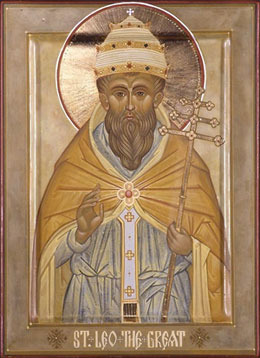 preserved - and thanks to his approximately 150 letters. In these texts the Pontiff appears in all his greatness, devoted to the service of truth in charity through an assiduous exercise of the Word which shows him to us as both
preserved - and thanks to his approximately 150 letters. In these texts the Pontiff appears in all his greatness, devoted to the service of truth in charity through an assiduous exercise of the Word which shows him to us as both
Theologian and Pastor. Leo the Great, constantly thoughtful of his faithful and of the people of Rome but also of communion between the different Churches and of their needs, was a tireless champion and upholder of the Roman Primacy, presenting himself as the Apostle Peter's authentic heir: the many Bishops who gathered at the Council of Chalcedon, the majority of whom came from the East, were well aware of this.
This Council, held in 451 and in which 350 Bishops took part, was the most important assembly ever to have been celebrated in the history of the Church. Chalcedon represents the sure goal of the Christology of the three previous Ecumenical Councils: Nicea in 325, Constantinople in 381 and Ephesus in 431. By the sixth century these four Councils that sum up the faith of the ancient Church were already being compared to the four Gospels. This is what Gregory the Great affirms in a famous letter (I, 24): "I confess that I receive and revere, as the four books of the Gospel so also the four Councils", because on them, Gregory explains further, "as on a four-square stone, rises the structure of the holy faith". The Council of Chalcedon, which rejected the heresy of Eutyches who denied the true human nature of the Son of God, affirmed the union in his one Person, without confusion and without separation, of his two natures, human and divine.
The Pope asserted this faith in Jesus Christ, true God and true man, in an important doctrinal text addressed to the Bishop of Constantinople, the so-called Tome to Flavian which, read at Chalcedon, was received by the Bishops present with an eloquent acclamation. Information on it has been preserved in the proceedings of the Council: "Peter has spoken through the mouth of Leo", the Council Fathers announced in unison. From this intervention in particular, but also from others made during the Christological controversy in those years, it is clear that the Pope felt with special urgency his responsibilities as Successor of Peter, whose role in the Church is unique since "to one Apostle alone was entrusted what was communicated to all the Apostles", as Leo said in one of his sermons for the Feast of Sts Peter and Paul (83, 2). And the Pontiff was able to exercise these responsibilities, in the West as in the East, intervening in various circumstances with caution, firmness and lucidity through his writings and legates. In this manner he showed how exercising the Roman Primacy was as necessary then as it is today to effectively serve communion, a characteristic of Christ's one Church. ...
In particular, Leo the Great taught his faithful - and his words still apply for us today - that the Christian liturgy is not the memory of past events, but the actualization of invisible realities which act in the lives of each one of us. This is what he stressed in a sermon (cf. 64, 1-2) on Easter, to be celebrated in every season of the year "not so much as something of the past as rather an event of the present". All this fits into a precise project, the Holy Pontiff insisted: just as, in fact, the Creator enlivened with the breath of rational life man formed from the dust of the ground, after the original sin he sent his Son into the world to restore to man his lost dignity and to destroy the dominion of the devil through the new life of grace.
This is the Christological mystery to which St Leo the Great, with his Letter to the Council of Ephesus, made an effective and essential contribution, confirming for all time - through this Council - what St Peter said at Caesarea Philippi. With Peter and as Peter, he professed: "You are the Christ, the Son of the living God". And so it is that God and man together "are not foreign to the human race but alien to sin" (cf. Serm. 64). Through the force of this Christological faith he was a great messenger of peace and love. He thus shows us the way: in faith we learn charity. Let us therefore learn with St Leo the Great to believe in Christ, true God and true Man, and to implement this faith every day in action for peace and love of neighbour.
Here are a few excerpts from St. Leo the Great's famed sermons:
On Peter and the Papacy:
The dispensation of Truth therefore abides, and the blessed Peter persevering in the strength of the Rock, which he has received, has not abandoned the helm of the Church, which he undertook. For he was ordained before the rest in such a way that from his being called the Rock, from his being pronounced the Foundation, from his being constituted the Doorkeeper of the kingdom of heaven, from his being set as the Umpire to bind and to loose, whose judgments shall retain their validity in heaven, from all these mystical titles we might know the nature of his association with Christ. And still to-day he more fully and effectually performs what is entrusted to him, and carries out every part of his duty and charge in Him and with Him, through Whom he has been glorified. And so if anything is rightly done and rightly decreed by us, if anything is won from the mercy of God by our daily supplications, it is of his work and merits whose power lives and whose authority prevails in his See. For this, dearly-beloved, was gained by that confession, which, inspired in the Apostle's heart by God the Father, transcended all the uncertainty of human opinions, and was endued with the firmness of a rock, which no assaults could shake. For throughout the Church Peter daily says, "Thou an the Christ, the Son of the living God," and every tongue which confesses the LORD, accepts the instruction his voice conveys. This Faith conquers the devil, and breaks the bonds of his prisoners. It uproots us from this earth and plants us in heaven, and the gates of Hades cannot prevail against it. For with such solidity is it endued by God that the depravity of heretics cannot mar it nor the unbelief of the heathen overcome it. (Sermon III)
On Arianism:
This union, dearly beloved, whereby the Creator is joined to the creature, Arian blindness could not see with the eyes of intelligence, but, not believing that the Only-begotten of God was of the same glory and substance with the Father, spoke of the Son's Godhead as inferior, drawing its arguments front those words which are to be referred to the "form of a slave," in 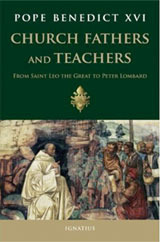 respect of which, in order to show that it belongs to no other or different person in Himself, the same Son of God with the same form, says, "The Father is greater than I," just as He says with the same form, "I and my Father are one." For in "the form of a slave," which He took at the end of the ages for our restoration, He is inferior to the Father: but in the form of God, in which He was before the ages, He is equal to the Father. In His human humiliation He was "made of a woman, made under the Law:" in His Divine majesty He abides the Word of God, "through whom all things were made." Accordingly, He Who in the form of God made man, in the form of a slave was made man. For both natures retain their own proper character without loss: and as the form of God did not do away with the form of a slave, so the form of a slave did not impair the form of God. And so the mystery of power united to weakness, in respect of the same human nature, allows the Son to be called inferior to the Father: but the Godhead, which is One in the Trinity of the Father, Son, and Holy Ghost, excludes all notion of inequality. For the eternity of the Trinity has nothing temporal, nothing dissimilar in nature: Its will is one, Its substance identical, Its power equal, and yet there are not three GodS, but one God; because it is a true and inseparable unity, where there can be no diversity. Thus in the whole and perfect nature of true man was true God born, complete in what was His own, complete in what was ours. And by "ours" we mean what the Creator formed in us from the beginning, and what He undertook to repair. For what the deceiver brought in, and man deceived committed, had no trace in the Saviour; nor because He partook of man's weaknesses, did He therefore share our faults. He took the form of a slave without stain of sin, increasing the human and not diminishing the divine: for that "emptying of Himself," whereby the Invisible made Himself visible, was the bending down of pity, not the failing of power. (Sermon XXIII)
respect of which, in order to show that it belongs to no other or different person in Himself, the same Son of God with the same form, says, "The Father is greater than I," just as He says with the same form, "I and my Father are one." For in "the form of a slave," which He took at the end of the ages for our restoration, He is inferior to the Father: but in the form of God, in which He was before the ages, He is equal to the Father. In His human humiliation He was "made of a woman, made under the Law:" in His Divine majesty He abides the Word of God, "through whom all things were made." Accordingly, He Who in the form of God made man, in the form of a slave was made man. For both natures retain their own proper character without loss: and as the form of God did not do away with the form of a slave, so the form of a slave did not impair the form of God. And so the mystery of power united to weakness, in respect of the same human nature, allows the Son to be called inferior to the Father: but the Godhead, which is One in the Trinity of the Father, Son, and Holy Ghost, excludes all notion of inequality. For the eternity of the Trinity has nothing temporal, nothing dissimilar in nature: Its will is one, Its substance identical, Its power equal, and yet there are not three GodS, but one God; because it is a true and inseparable unity, where there can be no diversity. Thus in the whole and perfect nature of true man was true God born, complete in what was His own, complete in what was ours. And by "ours" we mean what the Creator formed in us from the beginning, and what He undertook to repair. For what the deceiver brought in, and man deceived committed, had no trace in the Saviour; nor because He partook of man's weaknesses, did He therefore share our faults. He took the form of a slave without stain of sin, increasing the human and not diminishing the divine: for that "emptying of Himself," whereby the Invisible made Himself visible, was the bending down of pity, not the failing of power. (Sermon XXIII)
On Man Partaking in the Birth of Christ:
And so to undo this chain of sin and death, the Almighty Son of God, that fills all things and contains,all things, altogether equal to the Father and co-eternal in one essence from Him and with Him, took on Him man's nature, and the Creator and Land of all things deigned to be a mortal: choosing for His mother one whom He had made, one who, without loss of her maiden honour, supplied so much of bodily substance, that without the pollution of human seed the New Man might be possessed of purity and truth. In Christ, therefore, born of the Virgin's womb, the nature does not differ from ours, because His nativity is wonderful. For He Who is true God, is also true man: and there is no lie in either nature. "The Word became flesh" by exaltation of the flesh, not by failure of the Godhead: which so tempered its power and goodness as to exalt our nature by taking it, and not to lose His own by imparting it. In this nativity of Christ, according to the prophecy of David, "truth sprang out of the earth, and righteousness looked down from heaven." In this nativity also, Isaiah's saying is fulfilled, "let the earth produce and bring forth salvation, and let righteousness spring up together." For the earth of human flesh, which in the first transgressor, was cursed, in this Offspring of the Blessed Virgin only produced a seed that was blessed and free from the fault of its stock. And each one is a partaker of this spiritual origin in regeneration; and to every one when he is re-born, the water of baptism is like the Virgin's womb; for the same Holy Spirit fills the font, Who filled the Virgin, that the sin, which that sacred conception overthrew, may be taken away by this mystical washing. (Sermon XXIV)
The Triumph of the Cross:
The Cross of Christ, therefore, symbolize the true altar of prophecy, on which the oblation of man's nature should be celebrated by means of a salvation-bringing Victim. There the blood of the spotless Lamb blotted out the consequences of the ancient trespass: there the whole tyranny of the devil's hatred was crushed, and humiliation triumphed gloriously over the lifting up of pride: for so swift was the effect of Faith that of the robbers crucified with Christ, the one who believed in Christ as the Son of God entered paradise justified. Who can unfold the mystery of so great a boon? who can state the power of so wondrous a change? In a moment of thee the guilt of long evil-doing is done away; clinging to the cross, amid the cruel tortures of his struggling soul, he passes over to Christ; and to him, on whom his own wickedness had brought punishment, Christ's grace now gives a crown. (Sermon LV)
The Creed:
In that rule of Faith, dearly-beloved, which we have received in the very beginning of the Creed, on the authority of apostolic teaching, we acknowledge our Lord Jesus Christ, whom we call the only Son of God the Father Almighty, to be also born of the Virgin Mary by the Holy Ghost. Nor do we reject His Majesty when we express our belief in His crucifixion, death, and resurrection on the third day. For all that is God's and all that is Man's are simultaneously fulfilled by His Manhood and His Godhead, so that in virtue of the union of the Possible with the Impossible, His power cannot be affected by His weakness, nor His weakness overcome by His power. And rightly was the blessed Apostle Peter praised for confessing this union, who when the Lord was inquiring what the disciples knew of Him, quickly anticipated the rest and said, "Thou art Christ, the Son of the living God[2]." And this assuredly he saw, not by the revelation of flesh or blood, which might have hindered his inner sight, but by the very Spirit of the Father working in his believing heart, that in preparation for ruling the whole Church he might first learn what he would have to teach, and for the solidification of the Faith, which he was destined to preach, might receive the assurance, "Thou art Peter, and upon this rock I will build My Church, and the gates of hell shall not prevail against it[3]." The strength, therefore, of the Christian Faith, which, built upon an impregnable rock, fears not the gates of death, acknowledges the one Lord Jesus Christ to be both true God and true Man, believing Him likewise to be the Virgin's Son, Who is His Mother's Creator: born also at the end of the ages, though He is the Creator of time: Lord of all power, and yet one of mortal stock: ignorant of sin, and yet sacrificed for sinners after the likeness of sinful flesh. (Sermon LXII)
The Trinity:
But although, dearly-beloved, the actual form of the thing done was exceeding wonderful, and undoubtedly in that exultant chorus of all human languages the Majesty of the Holy Spirit was present, yet no one must think that His Divine substance appeared in what was seen with bodily eyes. For His Nature, which is invisible and shared in common with the Father and the Son, showed the character of His gift and work by the outward sign that pleased Him, but kept His essential property within His own Godhead: because human sight can no more perceive the Holy Ghost than it can the Father or the Son. For in the Divine Trinity nothing is unlike or unequal, and all that can be thought concerning Its substance admits of no diversity either in power or glory or eternity. And while in the property of each Person the Father is one, the Son is another, and the Holy Ghost is another, yet the Godhead is not distinct and different; for whilst the Son is the Only begotten of the Father, the Holy Spirit is the Spirit of the Father and the Son, not in the way that every creature is the creature of the Father and the Son, but as living and having power with Both, and eternally subsisting of That Which is the Father and the Son. And hence when the Lord before the day of His Passion promised the coming of the Holy Spirit to His disciples, He said, "I have yet many things to say to you, but ye cannot bear them now. But when He, the Spirit of Truth shall have come, He shall guide you into all the Truth. For He shall not speak from Himself, but whatsoever He shall have heard, He shall speak and shall announce things to come unto you. All things that the Father hath are Mine: therefore said I that He shall take of Mine, and shall announce it to you." Accordingly, there are not some things that are the Father's, and other the Son's, and other the Holy Spirit's: but all things whatsoever the Father has, the Son also has, and the Holy Spirit also has: nor was there ever a time when this communion did not exist, because with Them to have all things is to always exist. In them let no times, no grades, no differences be imagined, and, if no one can explain that which is true concerning God, let no one dare to assert what is not true. For it is more excusable not to make a full statement concerning His ineffable Nature than to frame an actually wrong definition. And so whatever loyal hearts can conceive of the Father's eternal and unchangeable Glory, let them at the same time understand it of the Son and of the Holy Ghost without any separation or difference. For we confess this blessed Trinity to be One God for this reason, because in these three Persons there is no diversity either of substance, or of power, or of will, or of operation. (Sermon LXXV)
November 9, 2011
Fr. Kenneth Baker, S.J., reflects on the meaning of Thanksgiving
From the November 2011 editorial for Homiletic & Pastoral Review:
Thanksgiving Day, on the last Thursday in November, is a major event in American culture and life. On this day, most Americans want to be, and try to be, home with their family. The feast is 400 years old, and was made a national holiday by President Lincoln in 1863.
In its origins, going back to the pilgrims at Plymouth, Massachusetts, in 1621, the celebration was primarily religious. After bringing in the harvest, and having profited from the abundance of nature, the pilgrims, trying to survive in a huge, untamed and dangerous new country, set aside a day to give thanks to Almighty God for his many benefits. It was fitting and proper that they should do so. We can thank Mr. Lincoln for setting aside one day in the year to give thanks to God for his goodness to us, personally, and for the abundance of nature that sustains us in life.
Most Americans still believe in God, and many go to church on Sunday, but secularism and materialism have taken their toll, so that the country, as such, is not as religious as it was in the beginning, or even as it was in the time of Lincoln. Since about the 1960s, there has been a concerted effort, on the part of many leaders in education, politics and the media, to ignore God, and to remove him from the public square. In a certain sense, belief in God is on the defensive, and secularism is constantly on the attack. Human freedom has been made into an absolute, and so God, with his Ten Commandments, is portrayed as an enemy of human freedom. That is just the opposite of the truth, since obedience to God, and love of him, is what makes a person truly free— that is, free to be what he should be, not free to do whatever he feels like doing. Consequently, for many Americans, Thanksgiving Day no longer has a religious meaning; rather, it is a day off from work, time for a turkey dinner and four-day weekend. For these folks, one wonders to whom their thanksgiving is directed. Is it to Uncle Sam?
Read the entire editorial on HPRweb.com.
Novelist Michael O'Brien visiting northern California, November 14-20
Bestselling author and iconographer Michael O'Brien is coming to northern California for a series of appearances and presentations, Nov. 14-20, related to his new book from Ignatius Press, The Father's Tale: A Novel. 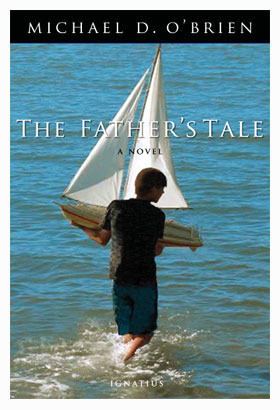
SCHEDULE:
7 p.m., Nov. 14 – St. Francis Solano Church, 469 Third Street West, Sonoma, (707) 996-6759. "Raising Strong Catholic Children: Countering the Secular Invasion of Family Culture." No charge – free-will offering.
7 p.m., Nov. 15 – Presentation of the BVM School, 4123 Robertson, Sacramento, (916) 482-0351. "Readers of the Lost Art: Reviving Culture through Good Reading." No charge – free-will offering.
Noon-1:30 p.m., Nov. 17 – Easter's Catholic Bookstore, 5290 Auburn Blvd., Sacramento, (916) 338-7272. Presentation on and book signing of The Father's Tale and other novels.
7:30 p.m., Nov. 18 – Kolbe Academy and Trinity Prep, 2055 Redwood Rd., Napa, (707) 258-9030. "Catholic Fiction & Restoring Culture in an Age of Escapist Illusions." No charge; free-will offering.
11 a.m.-12:30 p.m., Nov. 19 – St. Joseph's Catholic Store, 3369 Old California Way, Napa, (707) 224-8754. Presentation on and book signing of The Father's Tale and other novels.
7 p.m., Nov. 20 – St. Eugene Cathedral, Msgr. Becker Center, 2323 Montgomery Drive, Santa Rosa. "Longing for the Holy: Finding God in Truth, Goodness & Beauty." No charge; free-will offering.
"(This is) the best of Michael O'Brien's novels," said Ignatius Press Founder and Editor Fr. Joseph Fessio, S.J. "He creates characters like Dickens, explores human relationships like Austen, and has the epic scope of Tolstoy and Dostoyevsky. I believe this novel will merit inclusion in any list of the world's greatest novels."
For more information, to request a review copy of The Father's Tale or schedule an interview with Michael O'Brien, please contact Kevin Wandra of The Maximus Group at (678) 990-9032 or KWandra@MaximusMG.com.
You can read the opening pages of the novel on Ignatius Insight:
Benedict XVI reflects on depths of the longest Psalm; beauty of God's Word
From Vatican Information Service:
VATICAN CITY, 9 NOV 2011 (VIS) - In his general audience this morning Benedict XVI focused his catechesis on Psalm 119, the longest of the Psalms, constructed as an acrostic in which each stanza begins with one of the twenty-two letters of the Hebrew alphabet. Its subject matter is "the Torah of the Lord; that is, His Law, a term which in its broadest and most complete definition comprehends teaching, instruction and life guidance. The Torah is revelation, it is the Word of God which is addressed to man and which arouses his response of faithful obedience and generous love", the Pope said.
"The Psalmist's faithfulness arises from listening to the Word, from keeping it in his heart, meditating upon it and loving it, like Mary who 'treasured in her heart' the words addressed to her, the marvellous events in which God revealed Himself and asked for her response of faith", he explained. The Psalmist describes those who walk in the Law of the Lord as blessed, and indeed "Mary is blessed because she bore the Saviour in her womb, but above all because she accepted God's annunciation and treasured His Word attentively and lovingly".
Psalm 119 is constructed around this Word of life and blessing. Its central theme is the Word and the Law, and its verses are replete with synonyms thereof such as "precepts, decrees, promises", associated with verbs such as "to know, to love, to meditate, to live", the Holy Father explained. "The entire alphabet features in the twenty-two verses of the Psalm, as does the entire vocabulary of the believer's relationship of trust with God. We find praise, thanksgiving and trust, but also supplication and lamentation; however, all of them are pervaded by the certainty of divine grace and the power of the Word of God. Even those verses most marked by suffering and darkness remain open to hope and are permeated with faith".
The Law of God, which is "the centre of life", must be "listened to with obedience but not servility, with filial trust and awareness. To listen to the Word is to have a personal encounter with the Lord of life. ... The fulfilment of the Law is to follow Jesus". Thus Psalm 119 "guides us towards the Gospel", the Pope explained. In this context he focused particularly on verse 57: "The Lord is my portion; I promise to keep your words".
"The term 'portion'", he explained, "evokes the partition of the Promised Land among the tribes of Israel, when the Levites were given no part of the territory because their 'portion' was the Lord Himself. ... These verses are also important for us today, especially for priests, who are called to live from the Lord and from His Word alone, with no other guarantees, no other wealth, and having Him as their one source of true life. It is in this light that we can understand the free choice of celibacy for the Kingdom of heaven, which must be rediscovered in all its beauty and power.
"These verses are also important for the faithful, the People of God who belong only to Him", the Pope added in conclusion. "They are called to experience the radical nature of the Gospel, to be witnesses of the life brought by Christ, the new and definitive 'High Priest' Who offered Himself in sacrifice for the salvation of the world. The Lord and His Word are our 'land' in which to live in communion and joy".
20% off new children's books from Ignatius Press & Magnificat

20% off Magnificat Children's Books | Offer ends Tuesday, November 15th, 2011 at 12:00 midnight EST. These prices are available online only through Ignatius.com
Preaching by Charity! Read an interview with Msgr. Leo Maasburg on the life of Mother Teresa in the latest edition of Catholic World Report. Read it online here.
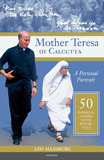 Mother Teresa of Calcutta
Mother Teresa of Calcutta
A Personal Portrait: 50 Inspiring Stories Never Before Told
Leo Maasburg
Mother Teresa's life sounds like a legend. The Albanian girl who entered an Irish order to go to India as a missionary and became an "Angel of the Poor" for countless people. She was greatly revered by Christians as well as Muslims, Hindus and unbelievers, as she brought the message of Christian love for one's neighbor from the slums of Calcutta to the whole world. Fr. Leo Maasburg was there as her close companion for many years, traveling with her throughout the world and was witness to countless miracles and incredible little-known occurrences. In this personal portrait of the beloved nun, he presents fifty amazing stories about her that most people have never heard. Also available as an e-book.
 A Pop-Up Advent Calendar with Booklet
A Pop-Up Advent Calendar with Booklet
Maite Roche
This brightly illustrated Advent calendar changes day by day into a multi-dimensional Nativity scene. Beginning the first of December and continuing through the big feasts of the Christmas Season, children can open a window each day to reveal a new detail or a new character of the Nativity scene.
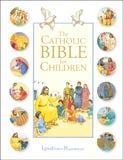 The Catholic Bible for Children
The Catholic Bible for Children
From the creation of the world to the infancy of the Church, the important stories from both the Old and New Testament are vividly retold and illustrated for young people. Also included are chapters on the prophets and the psalms. In the back is a glossary of important people, places and objects, providing added information.
 Francis
Francis
The Poor Man of Assisi
Juliette Levivier
Francis of Assisi, one of the most famous and beloved saints, comes to life for young people in this addition to The Life of a Saint series. With vivid, four-color pictures on every page, the book shows Francis becoming a brother and friend to all- lepers, the poor, and animals too.
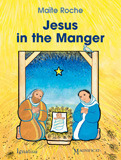 Jesus in the Manger
Jesus in the Manger
Maite Roche
Jesus in the Manger tells the story of Christ's birth to very young children. Warm and inviting illustrations with enchanting, interactive flaps help toddlers learn to recognize Mary, Joseph and baby Jesus, as well as the angel Gabriel, Mary's house in Nazareth and the stable in Bethlehem. This engaging book will be enjoyed over and over again by little ones who will soon be telling the Christmas story themselves.
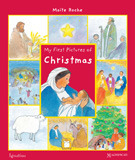 My First Pictures of Christmas
My First Pictures of Christmas
Maite Roche
With sweet, four-color pictures, this board book with rounded corners introduces toddlers to the story of Christmas. Baby Jesus, Mary and Joseph, the shepherds, the angels, and the wise men - all are illustrated with large, inviting pictures. On the opposing pages, are several smaller pictures with details from the scene: the donkey, the manger, the sheep, etc. By pointing out and naming the pictures with a parent, even very young children can come to know and love the Christmas story.
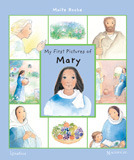 My First Pictures of Mary
My First Pictures of Mary
Maite Roche
This charming board book with rounded corners introduces toddlers to their Blessed Mother Mary with sweet, four-color pictures. Key moments in Mary's life are illustrated with one large picture and, on the opposing pages, several smaller pictures containing details from the scene. By pointing out and naming the pictures with a parent, even very young children can come to know and love Mary, the mother of Jesus.
For Additional Sale Items Click HERE!
November 8, 2011
Abp. Charles J. Chaput offers "four points in defense of human dignity"
From the essay, "Being Human in an Age of Unbelief", adapted from a talk given yesterday by Abp. Chaput at the University of Pennsylvania:
Here's my first point. We remember Bonhoeffer, Solzhenitsyn, and other men and women like them because of their moral witness. But the whole idea of "moral witness" comes from the assumption that good and evil are real, and that certain basic truths about humanity don't change. These truths are knowable and worth defending. One of these truths is the notion of man's special dignity as a creature of reason and will. Man is part of nature, but also distinct from it.
The philosopher Hans Jonas said that three things have distinguished human life from other animal experience since early prehistory: the tool, the image, and the grave. The tool imposes man's knowledge and will onto nature. The image—man's paintings and other art—projects his imagination. It implies a sense of beauty and memory, and a desire to express them. But the greatest difference between humans and other animals is the grave. Only man buries his dead. Only man knows his own mortality. And knowing that he will die, only man can ask where he came from, what his life means, and what comes after it.
The grave then is an expression of reverence and hope. When Christians and other people of good will talk about "the dignity of the human person" and "the sanctity of human life," they're putting into words what we all instinctively know—and have known for a very long time. Something elevated and sacred in men and women demands our special respect. When we violate that human dignity, we do evil. When we serve it, we do good. And therein lies one of many ironies. We live in a society that speaks persuasively about protecting the environment and rescuing species on the brink of extinction. But then it tolerates the killing of unborn children and the abuse of human fetal tissue as lab material.
Read the entire address on the Public Discourse site.
Carl E. Olson's Blog
- Carl E. Olson's profile
- 20 followers



